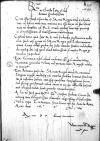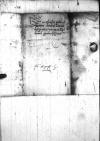List #3174
Mikołaj GRABIA do Ioannes DANTISCUSPiotrków, 1547-07-26
| odebrano Heilsberg (Lidzbark Warmiński), 1547-08-05 Rękopiśmienne podstawy źródłowe:
Pomocnicze podstawy źródłowe:
| ||||||
Tekst + aparat krytyczny + komentarzZwykły tekstTekst + komentarzTekst + aparat krytyczny
Reverendissimo in Christo Patri et Domino, domino
Reverendissime in Christo Pater et Domine, domine gratiosissime.
Cum
Ceterum nova, quae hinc Reverendissimae Paternitati Vestrae scribenda existimarem, nulla alia sunt, nisi quod iam cum sacra
Ex
Ex
Alia non sunt, quae Reverendissimae Paternitati Vestrae scribam. Cui me servitiaque mea diligentissime commendo eamque optime et felicissime valere cupio.
Reverendissimae Paternitatis Vestrae bonus servitor


 BCz, 247, p. 426
BCz, 247, p. 426